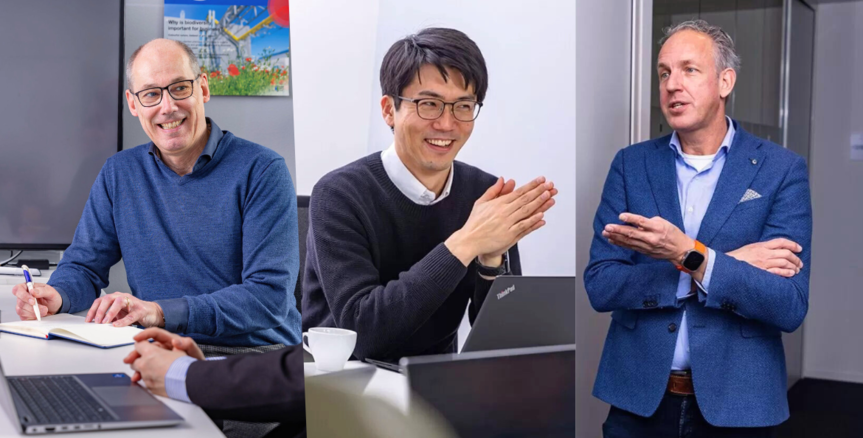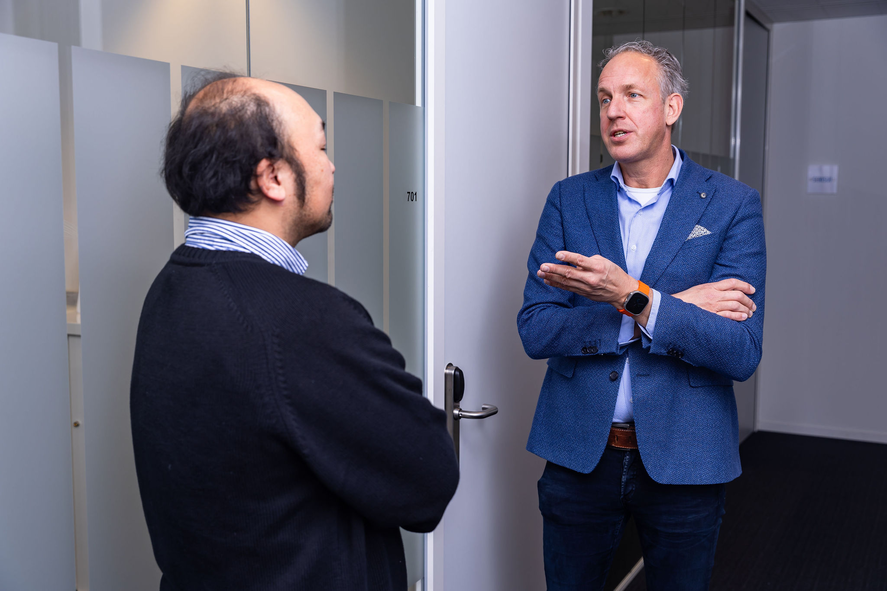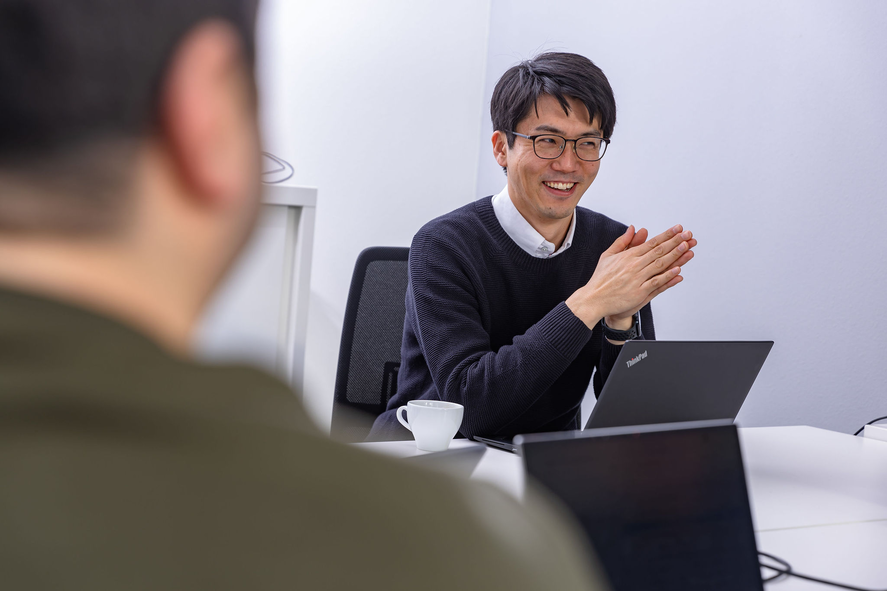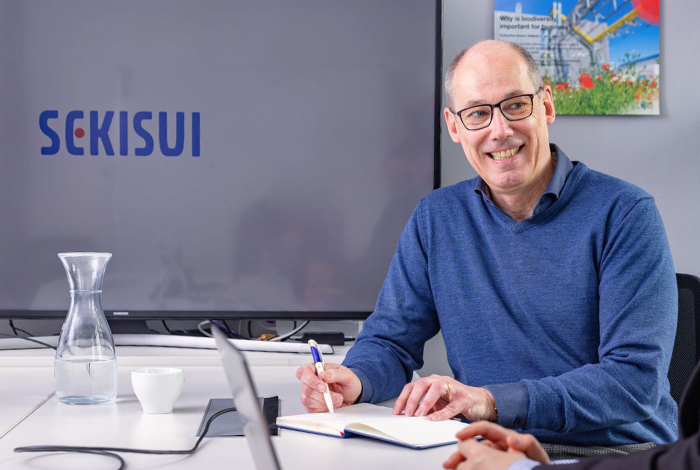Japanese and Western Business Cultures at SEKISUI
Ramon Aben (Head of Coporate IT), Alfred van der Zande (Senior Legal Counsel), and Kazutoshi Ogami (HR Assistant Manager), took part in a cross-cultural interview to talk about the cultural differences between Japanese and Western business styles at SEKISUI.

Hello everyone, we're happy to have you to tell us more about the work atmosphere and cultures within SEKISUI EUROPE. To start, what was your first impression when you joined the SEKISUI EUROPE team? Was there a culture shock?
Kazutoshi: Compared to my colleagues in Japan, it’s clear that my European colleagues are not shy about expressing their opinions. In Japan, this direct communication style would be seen as rude, especially when talking to an older colleague or someone in a higher position. In Japan, age is highly respected and synonymous with the hierarchy within a company.
Alfred: It became clear to me, especially in (online) meetings, that there is more hierarchy within the departments with Japanese colleagues. Our Western communication style is more direct.
Ramon: From the first day, it felt like a family, where you are part of a professional team. After working abroad for years (also in Asia), I can say that it is enriching to work with an international team.
SEKISUI is a global company with sister companies around the world. How do you experience this? Do you also work with SEKISUI companies from other countries?
Ramon: From the IT team, we are working hard to operate as one global team, including a strong and solid relationship with our Japanese headquarters and the various regional teams. Together, we are working on an innovative and strong digital strategy that can serve as a foundation for the growth of our companies.
Kazutoshi: I am currently working on a project for the management of expats in Europe. For this project, I collaborate with other HR employees from SEKISUI companies in Europe, America, and Japan. Through this collaboration, I also learn about good initiatives from the different SEKISUI companies.
Alfred: In my role as in-house legal counsel responsible for the European region, I have a lot of contact with other employees from the legal departments in Japan, America, and the United Kingdom. Sharing knowledge, having discussions, and asking each other’s opinions are part of this. Many legal topics (such as Privacy Law) not only affect SEKISUI in Europe but also the companies in other regions.

At its core, SEKISUI is a large Japanese company. How does this influence the way business is conducted at the European headquarters? Are there any specific Japanese practices that you incorporate?
Alfred: Yes, collaboration is crucial in Japanese business culture. Before a final decision is made, it is customary to ask for feedback from the Japanese headquarters on your opinion and advice through colleagues.
Ramon: We always respect each other’s strengths and weaknesses so that we can grow together as a team. A Japanese saying is: a journey of a thousand miles begins with a single step. And that is what we do as a team; we keep growing continuously.
The team at SEKISUI EUROPE is a mix of different nationalities. What do you think are the biggest differences between the Japanese and Western colleagues in terms of working methods?
Ramon: A good example of a cultural difference is working according to the ‘KAIZEN’ method, which we apply in our daily operations. KAIZEN is a Japanese methodology that focuses on continuously making small improvements to ensure an optimal work and production process.
Alfred: The Western style is more informal, and hierarchy is less important. The Japanese style is very disciplined and organized. The challenge is to bring the best of both worlds together.
Kazutoshi: European colleagues are more casual in the office compared to Japanese colleagues. For example, everyone addresses each other by their first name. I also find this pleasant because it makes communication with my colleagues easier. Calling each other by the first name would be considered rude in Japan. Another difference is the dress code. Japanese businessmen typically always wear a suit to work, while in Europe, the dress code at work is more ‘business casual.’ This is also something I find pleasant.

Does working for a Japanese multinational influence your work? Are there certain aspects that you do differently here?
Kazutoshi: I don’t think I perform different tasks here in Europe. What I do notice is that I have more freedom in Europe. In Japan, it was my task to keep my supervisors informed about my work. Since the working method in Europe is different, I have more freedom to make my own decisions.
Alfred: Due to the different communication styles, I notice that sometimes more steps are needed before a decision is made. This can sometimes be difficult if you are used to the direct approach in the Netherlands. But I am, of course, always willing to learn new ways!
Are there any challenges that have arisen due to this unique mix of nationalities and work cultures? How do you deal with them?
Ramon: The language (variety in English proficiency among colleagues) can sometimes be a challenge, but it also makes the work interesting. Ultimately, we always find a good solution and agree on our common goals.
Kazutoshi: The different communication styles were a bit of a challenge at first. The Japanese style is indirect, polite, and formal, while the Western style is more direct and informal. When I speak with my European colleagues, I try to communicate more directly because otherwise, it can sometimes be difficult for me to convey my message clearly.
Alfred: In the past, I have worked for various international organizations. It is important to respect each other’s differences in culture, work style, and so on. You can learn a lot from this! Ultimately, it is better for everyone if we can learn from each other’s worlds and collaborate.

Finally, what do you think is a major advantage of working at SEKISUI in Europe, together with so many international colleagues?
Ramon: Working in a company with such a deeply rooted culture is a true enrichment of both your professional and personal life.
Alfred: SEKISUI gives you a lot of responsibility to manage your own tasks. We work with people from very diverse backgrounds. SEKISUI is aware of this, for example by organizing workshops where we learn more about each other’s culture and how we can learn from our differences.
Kazutoshi: I see it as a great advantage that I can learn a lot from my colleagues within SEKISUI. It is nice and educational to be able to work with such colleagues!